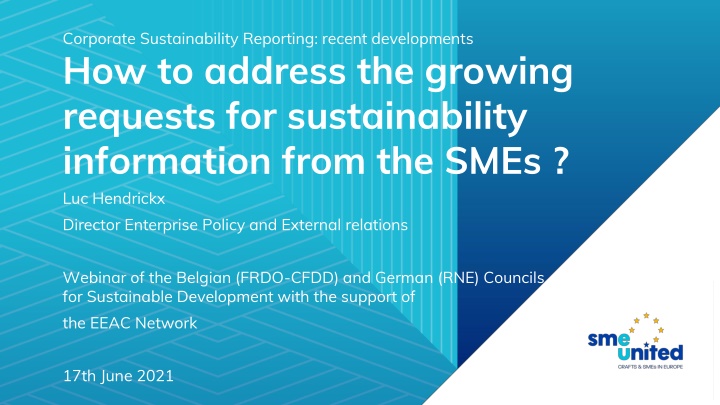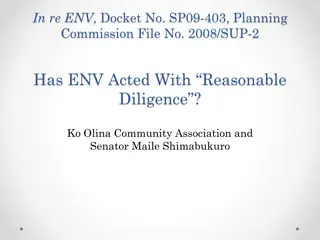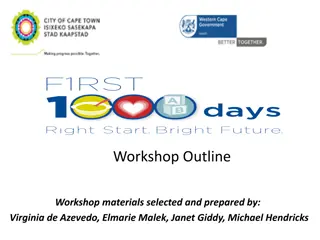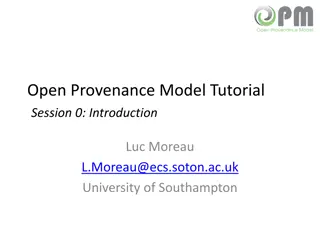
Addressing Growing Requests for Sustainability Information from SMEs
Learn about recent developments in corporate sustainability reporting and how to address the increasing demands for sustainability information from SMEs. Discover insights from Luc Hendrickx and discussions from prominent councils for sustainable development. Explore the transition from CSR to sustainability reporting, the Non-Financial Reporting Directive, and the importance of enhancing non-financial disclosure for investors and stakeholders.
Download Presentation

Please find below an Image/Link to download the presentation.
The content on the website is provided AS IS for your information and personal use only. It may not be sold, licensed, or shared on other websites without obtaining consent from the author. If you encounter any issues during the download, it is possible that the publisher has removed the file from their server.
You are allowed to download the files provided on this website for personal or commercial use, subject to the condition that they are used lawfully. All files are the property of their respective owners.
The content on the website is provided AS IS for your information and personal use only. It may not be sold, licensed, or shared on other websites without obtaining consent from the author.
E N D
Presentation Transcript
Corporate Sustainability Reporting: recent developments How to address the growing requests for sustainability information from the SMEs ? Luc Hendrickx Director Enterprise Policy and External relations Webinar of the Belgian (FRDO-CFDD) and German (RNE) Councils for Sustainable Development with the support of the EEAC Network 17th June 2021
SMEunited: who we are Membership Around 60 member organisations from over 30 countries: Full members: national horizontal cross sectoral SME organisations Associate members: European and International Sectoral organisations, nonEU cross sectoral SME organisations. SMEunited is i.a. member of: o Platform on Sustainable Finance o EFRAG s Project Task Force European Sustainablity Reporting Standard
From CSR to Sustainability Information GREEN Corporate Social Responsibility COM(2001) 366 final European Multistakeholder Forum on CSR (October 2002 2015 ?) Non-Financial Reporting Directive (2014) Review NFRD (2020- ) rebaptised CSRD Sustainable Finance Taxonomy (2019- ) Corporate Governance & Due Diligence (2021 - ) PAPER Promoting a European framework for
Non-Financial Reporting Directive Directive 2014/95/EU: amends the accounting directive 2013/34/EU. Companies are required to include non-financial statements in their annual reports from 2018 onwards. To report information regarding the environment, social and employee issues, human rights, bribery and corruption, on an annual basis Only applies to large public-interest companies with more than 500 employees: listed companies, banks, insurance companies, other companies designated by national authorities as public-interest entities Limited to +- 6000 EU companies
Review Non-Financial Reporting Directive European Green Deal (11/12/2019): companies and financial institutions should improve their disclosure of non-financial information so that investors are better informed about the sustainability of their investments. Capital Markets Union Conclusions, the Council (12/2019) stressed the importance of reliable, comparable and relevant information on sustainability risks, opportunities and impacts, and called on the Commission to consider the development of a European non-financial reporting standard. Regulation on a classification system (taxonomy) of sustainable economic activities
Review Non-Financial Reporting Directive : arguments a. Reported non-financial information is not sufficiently comparable or reliable. b. Companies do not report all non-financial information that users think (sic) is necessary, and many companies report information that users do not think is relevant. c. Some companies from which investors and other users want non- financial information do not report such information. d. It is hard for investors and other users to find non-financial information even when it is reported.
Review Non-Financial Reporting Directive state of play Adopted by the College 21st April 2021 Pretended Scope : o ALL > 250 companies o Listed SMEs (except micro s): specific compulsory standard o SME standard voluntary for non-listed companies Scope and content can still be changed by EP and Council + goldplating Development of a European non-financial reporting standard (EFRAG-Lab report 8th March 2021) + The draft EU sustainability reporting standards will be developed by EFRAG.
Principle of double materiality Proposal clarifies the principle of double materiality: companies should report information necessary to understand how sustainability matters affect them and information necessary to understand the impact they have on people and the environment.
Sustainability reporting standards for SMEs (art 19c) The Commission shall adopt delegated acts in accordance with Article 49 to provide for sustainability reporting standards proportionate to the capacities and characteristics of small and medium-sized undertakings. Those sustainability reporting standards shall specify which information referred to in Articles 19a and 29a small and medium-sized undertakings referred to in Article 2, point (1)(a) shall report. They shall take into account the criteria set out in Article 19b, paragraphs 2 and 3. They shall also, where relevant, specify the structure in which that information shall be reported. The Commission shall adopt those delegated acts at the latest by 31 October 2023.
Main shortcomings: Trickle down effect CSRD will neither benefit SMEs nor their direct stakeholders Uncertainty on SME standard : Listed SME one or real SME (micro) standard? In absence of timely SME-standard market will impose big industry one SMEs will have in practice no transposition period (contrary to Listed SMEs 3 years) No guarantee that SME standard will be accepted by non-SME clients Assurance! No one in/one out compensation We estimate costs for SMEs: between 10 and 200 billion euro. No budget for SME support / awareness
Requests for more sustainable information from SMEs? A challenging situation: Heterogenity Today largely narrative Spontaneous and informal adapted to and for their own stakeholders (contrary to CSRD: purely for the upstream supply chain) Needs to be useful for the management/functioning of the enterprise No uniform monitoring Independent verification? too expensive for majority of SMEs ! Certification? too expensive for majority of SMEs !
SME challenges SMEs are not capable of performing on their own sophisticated analysis on: Technical screening criteria Life-cycle analysis Greenhouse gas (GHG) calculations Etc Even complying with regulations, standards, permits, and administrative formalities affects SMEs more than bigger companies due to their limited financial and human resources !!
SME needs and proposals Proportionality principle needs to be respected + Think Small First In some cases sectoral approach can be a solution . Reporting tailored to their limited resources and capacities (also v v their supply- chain) Make use of what already exists: Reporting turnover & bills/databases electricity-use, energy-use, water-use, . Building-renovation: energy performance certificate comparison before and after Energy audits, water audits ? Some SMEs can use labels (e.g. EU Energy label, EU Ecolabel, etc ) but on a voluntary basis Some SMEs can use certification schemes (e.g. ISO, Ecocert, T V) already existing on the EU or regional markets, but on a voluntary basis.
EFRAG-Lab report OVERARCHING PRINCIPLE 1: AN INCLUSIVE RANGE OF SUSTAINABILITY REPORTING STAKEHOLDERS OVERARCHING PRINCIPLE 2: A PRINCIPLE-BASED SUSTAINABILITY REPORTING SYSTEM 6 Building blocks SUPPORTING THE EU SUSTAINABLE DEVELOPMENT AND SUSTAINABILITY REPORTING MOMENTUM BUILDING FROM AND CONTRIBUTING TO SUSTAINABILITY REPORTING GLOBAL COHERENCE AND CONVERGENCE ADDRESSING THE SPECIFIC CHALLENGES OF FINANCIAL INSTITUTIONS INCLUDING SMEs IN THE EU SUSTAINABILITY REPORTING LANDSCAPE IN A PROPORTIONATE MANNER FOSTERING SECTOR-SPECIFIC SUSTAINABILITY REPORTING RELEVANCE ACKNOWLEDGING THE IMPORTANCE OF INTANGIBLES IN SUSTAINABILITY REPORTING
EFRAG-Lab report : A proportionate standard-setting approach tailored for EU SMEs. The ESS should consider adopting a proportionate standard-setting approach tailored for EU SMEs. This would take the form of SME-specific standards aiming at balancing: (i) the specific governance, organisational and resources availability aspects of SMEs and (ii) the need for sustainability information produced by SMEs to be relevant for their stakeholders, i.e. coherent with reporting requirements. The SME standard should follow the Think small first approach, instead of simply downgrading the standard for large companies. their own
Further reading EFRAG Report: https://www.efrag.org/Assets/Download?assetUrl=%2Fsites% 2Fwebpublishing%2FSiteAssets%2FEFRAG%2520PTF- NFRS_MAIN_REPORT.pdf Series of webinars on the EU taxonomy Discussion on future developments with the Platform on Sustainable Finance | European Commission (europa.eu): https://ec.europa.eu/info/events/finance-210224-sustainable- finance-platform-webinars_en#agenda https://www.smeunited.eu/news/non-financial-information- reporting-has-to-remain-voluntary-for-smes
Thank you for your attention! l.hendrickx@smeunited.eu Facebook: SMEunited.Europe Twitter: @SMEunited www.SMEunited.eu







